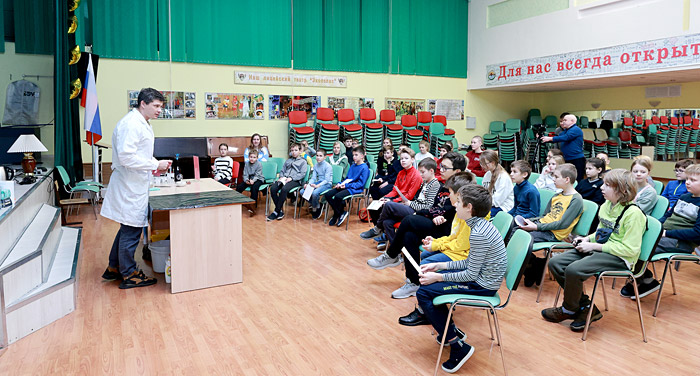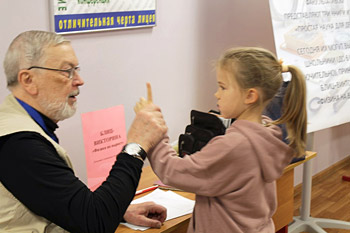
Electronic english version since 2022 |
The newspaper was founded in November 1957
| |
|
Number 45 (4693) |
Learning with passion
Physics Days resumed after a break
This year, Physics Days were held on 24 November. Lyceum No.6 hosted a team multidisciplinary Olympiad, a multidisciplinary "Karusel", experiments on chemistry, a quiz "Pro-chemistry", a blitz quiz "Physics for increase", master classes in various subjects and a demonstration of physical experiments at the UC premises.
More than 170 schoolchildren from Dubna, Dolgoprudny and Dmitrov, 35 volunteers - students of the G.N.Flerov and V.G.Kadyshevsky lyceums, as well as students of the Dubna University participated in the event.
"Physics Days were once held in JINR Conference Centre and Cultural Centre "Mir". Why are now they held at Lyceum No.6?" I ask the Chairman of the Organizing Committee of the event Petr Shirkov.

"Before the pandemic, we used the premises of the Cultural Centre "Mir". Then, renovations were done there and the small hall on the second floor is today occupied by the exhibition "Basic facilities of JINR" and we have lost the space of the Cultural Centre. The pandemic has made adjustments. We had a break in holding Physics Days, although other events that JINR organizes, such as a technical hackathon and Cyber Dubna were held online, even during the pandemic. Last year, we held Physics Days at the V.G.Kadyshevsky Lyceum. There are enough premises in the Lyceum No.6, Directorate of the Lyceum reacted favorably to our idea. We took the opportunity to hold an event on the basis of another school in Dubna.
We had a fairly wide geography of participants. When Mikhail Nitishinsky began organizing the Days and afterwards, Mikhail Zhabitsky continued to organize them, since 2016 one of the tasks has been to involve partners from different cities. St. Petersburg, Bryansk, Moscow were regular participants in the Days and sometimes, teams from other cities joined. The idea was to expand the geography as much as possible so that children could communicate. In fact, the history here is quite old. In the 1980s, when the JINR Evening School of Physics and Mathematics was open on the basis of the Cultural Centre (the idea of A.N.Skrinsky was implemented by E.P.Zhidkov), the Joint Institute held an All-Union Conference of Schoolchildren in Dubna. For several days, there were reports, competitions and demonstrations of experiments. The geography of the Conference was very wide: schoolchildren from Siberia and the Far East came to Dubna.

For some reasons, we were unable to organize Physics Days in spring, at the traditional time during spring break. If we haven't carried them out now, the break along with Covid would have been too long and it would have been difficult to recover later. We did it now, but realized that the timing was wrong, because by the end of November, schoolchildren were simply exhausted from the Olympiads. There are more Olympiads. An Olympiad is a key criterion for the certification of educational institutions; schools receive orders to participate. The preliminary stages of the All-Russian Olympiads in mathematics, physics and chemistry at the municipal level end by the New Year. Only the students that aim for the Olympiads continue further and everyone else can try himself in other projects related to engineering and design activities, with experiments in physics. We hope that full-fledged Physics Days will be held in spring and colleagues from the JINR UC will help to make it happen.
 While holding these Days, we saw that there were much fewer children interested in natural sciences, engineering and technology after the pandemic. Before the pandemic, the record for participation was about 300 children going through various challenges per day. Today, something completely amazing has happened to us. Only one team registered for the team Olympiad in mathematics, physics, technology and biology. We tried not to let the students know this. They completed the work and passed it and became winners. We expected many more children at the master classes, but we were able to record only one full session at four master classes and two - at the fifth one. About two thirds of children from our forecast...
While holding these Days, we saw that there were much fewer children interested in natural sciences, engineering and technology after the pandemic. Before the pandemic, the record for participation was about 300 children going through various challenges per day. Today, something completely amazing has happened to us. Only one team registered for the team Olympiad in mathematics, physics, technology and biology. We tried not to let the students know this. They completed the work and passed it and became winners. We expected many more children at the master classes, but we were able to record only one full session at four master classes and two - at the fifth one. About two thirds of children from our forecast...
Since Lyceum No.6 kindly responded to the request of JINR UC Director D.V.Kamanin, we were able to hold these Physics Days and met a new team of volunteers - high school students of the Lyceum. This year, we have staffing problems, as there are fewer young scientists, engineers and technicians that extensively worked with children before the pandemic. Currently, there are only 6-7 people left among the senior mentors working in schools, universities or JINR. We had to attract high school students to fill other positions. The main workload fell on volunteers from the V.G.Kadyshevsky Lyceum that stood at the "Karusel" stations and carried out master classes. Of course, we prepared them, this is a fantastic school for early pedagogical mentoring for them. Of course, in many ways they learn even more than their students, because they have to rethink the content of the subject and its presentation. Of course, their level is not the same as that of candidates of science or professional engineers, we understand it very well. We had no choice. And how to support this contingent is a big question for me.
I.A.Lomachenkov has always had a lot of children, both during the year at the "Experimental Physics" course at the UC and at demonstrations of experiments at Physics Days. This year, 4-5 people attend his classes and at present, 5 people have also come to demonstrate the experiments!"
And what a stir there has always been at these demonstrations in JINR Conference Centre and Cultural Centre "Mir"!
- Yes, because parents and grandparents came. During the experiments that the children demonstrated, JINR employees stood there and wondered how this could happen! Preparation is a very painstaking work, it's impossible to count how much effort and time it takes, but one thing is clear: it needs to be preserved and supported and perhaps, some new forms must be invented.
Did you invite regular non-resident participants of the Physics Days this time?
- Of course, they have already asked from Moscow, St. Petersburg, they were interested in whether we would resume the event. We hope they will appear in spring. It was unrealistic to come today, these same students participate in the Olympiads.
The first pancake after the pandemic turned out to be lumpy...
- I wouldn't say it's lumpy. The students, including small children, walked along the "Karusel" with pleasure. For some, the tasks were completely unexpected; they did not know how to approach them. We were just expecting more children. It's good that JINR supports us and the university continues to participate in the Days, but what is significant is that they could not attract students; master classes were carried out by teachers. We will try to preserve Physics Days.
I met A.A.Leonovich, a participant of the Days of the Teacher of the Interschool City Physics and Mathematics Elective, with a bag of books.
- Yes, I'm bringing it here because there are still children who read books, because otherwise these books would not be published in such circulation, even this confuses me. For the second time since the pandemic, we are holding one of the Physics Days events - a quiz for students up to 6th grade inclusive, that is, until they begin to study physics at school. They answer qualitative questions related to subjects that they studied in elementary school and began to master in grades 5-6 - "Natural history", "The world around us", "Geography", "Biology". The questions are posed so that they feel how the subject they will study relates to a variety of natural phenomena. Last time, we were convinced that our children's imagination is extraordinary, they came up with such things, such situations, explained something obvious in this way that speaks, on the one hand, about their erudition and on the other, that from nature, from life they are sufficiently cut off from. Digital generation! Nevertheless, from the fact that children from the 6th grade and even 5th graders begin to attend our city physics and mathematics elective, it is clear that there are children that show interest in natural science subjects, read not only textbooks and sometimes produce very interesting comments on what we are discussing. It allows, based on the results of the quiz, depending on what they have invented or fantasized, to reward them with books that were written based on experience working with such children, because I have been doing this for more than 30 years. It was protophysics that I taught in elementary school and taught at this lyceum children in grades 5-6. It was quite interesting, some material accumulated and in the first edition of this book I thank the children for encouraging me to do this. Since then, these books have been published and reprinted. At present, they come out in several versions: "Physics without formulae", "Fascinating bionics", "Amazing technology" in a small format, but inside everything that my son and I, and he is the illustrator of this book, have created has been preserved. If someone reads this, if someone is interested, we will be only glad. This work is not related to a specific educational process - assignments, assessments and so on, this is pure education.
Olga TARANTINA,
photo by Igor LAPENKO
and from the website of Lyceum No.6